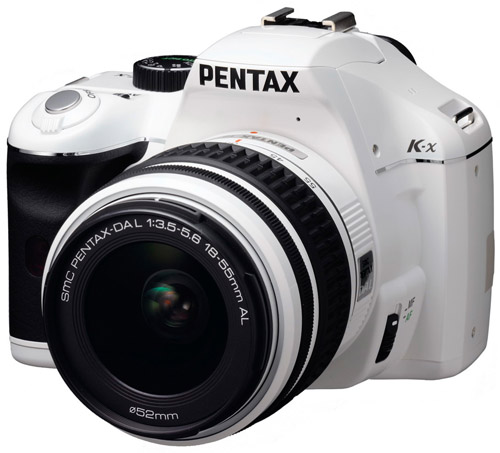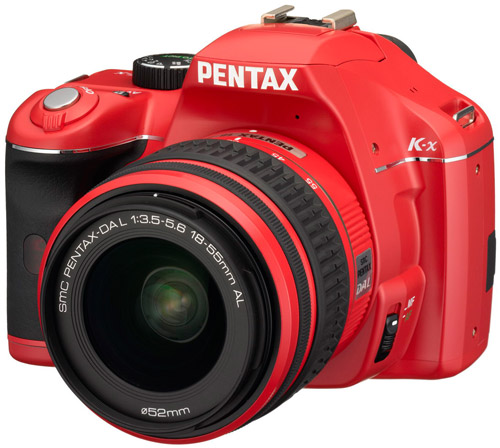
Pentax K-x (space white)
Following up on their K-7, Pentax has now come up with an entry-level K-x. While it doesn’t bring anything groundbreaking that wasn’t already seen on the K-7, it packs in many of the features seen on many competitors’ midrange model, and perhaps pending reviews on image quality and disregarding the overall Pentax system upgrade options, is probably the best choice out there currently for the beginning photographer/student.
The big headline features:
- 12.4MP CMOS (different from the K-7 14.6MP sensor, but interestingly also uses CMOS unlike all previous Pentaxes which used CCDs)
- ISO up to 12.8k
- Live-view with face-detect AF
- 720p, 24fps video
- 4.7fps continuous shooting
- $650 MSRP with 18-55 kit lens (and likely to drop further once it gets off pre-order)
A comparison:
Pentax K-x comparison
| Camera | Canon Rebel XS | Nikon D3000 | Pentax K-x | Nikon D5000 | Canon Rebel T1i |
|---|---|---|---|---|---|
| Sensor, crop | 10MP, 1.6x | 10MP, 1.5x | 12MP, 1.5x | 12MP, 1.5x | 15MP, 1.6x |
| ISO range | 100-1600 | 100-3200 | 100-12800 | 200-6400 | 100-12800 |
| Live-view? | Yes | No | Yes | Yes | Yes |
| Live view AF | Yes | None | Yes, face-detect | Yes, face-detect | Yes, face-detect |
| Video | None | None | 1280x720, 24fps | 1280x720, 24fps | 1920x1080, 20fps |
| AF | 7pt, 1 cross-type | 11pt, no cross | 11pt, 9 cross-type | 11pt, 1 cross-type | 9pt, 1 cross-type |
| Continuous FPS | 3fps jpg, 1.5fps raw | 3fps | 4.7fps | 4fps | 3.4fps |
| Image stabilization | lens-based | lens-based | sensor-based | lens-based | lens-based |
| Size | 127 x 97 x 61mm | 127 x 97 x 64mm | 122 x 91 x 69mm | 127 x 104 x 79mm | 130 x 97 x 61mm |
| Weight | 450g | 485g | 516g | 560g | 480g |
| Price (with kit lens, Amazon) | $499.95 | $529.95 | $649.95 | $719.63 | $781.89 |
In a comparison with the $500 entry-level cameras, the K-x blows them away in nearly aspect, and goes toe-to-toe or even exceeds the D5000 and Rebel T1i in every single category, despite being significantly cheaper (especially once the street price drops lower from MSRP)
Interestingly enough, the Pentax K-x will come in a variety of colors, including an ultra-spiffy red (below), the space white shown above, and your ordinary black.
Interestingly enough, Pentax Japan features a site where you can come up with your own custom color scheme, and apparently order it as well, which personally is an insanely appealing prospect.

Pentax K-x (red)




Got my K-x and sadly, there’s big problem as a video camera, as I show in this video…
http://leestranahan.com/?p=455
Having just watched Lee’s own video about how he’s found the solution to his problem mentioned above, I guess I should post his link for the sake of completeness.
http://www.youtube.com/watch?v=68AQzJE1tdI&feature=player_embedded
Myself – I got the white version and have trouble understanding why cameras are still all black when a hot camera means, as best I understand it, excess noise in your photos. The camera shop told me that Canon L series lenses went white to reduce heat – so why is everyone else so keen on black?
Anyway – the K-x seems great, though it’s early days yet for me.
A hotter sensor would lead to more thermal noise, but I would think that the readout noise would still be the dominant form for the daylight situations where your camera might actually get hot (thermal noise needs some time (i.e. long exposures) for electrons to start bleeding out to adjacent photo wells).
Also in those sunny situations, there’s plenty of light to be shooting at ISO200 or even ISO100, so noise isn’t a huge issue anyhow.
Though you’re right, if you were after the best camera possible noise-wise, white would be the better choice. But like temperature distorting the optics of lenses, the effect isn’t the big night-and-day difference that would cause all the manufacturers to make the switch, especially over simple tradition, branding, and users’ aesthetic preferences.